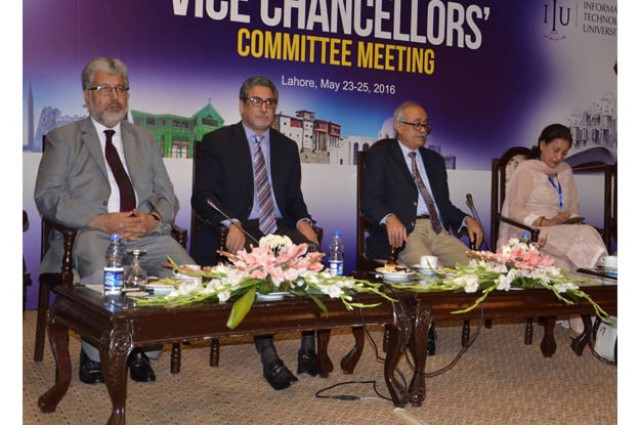Higher education: VCs pledge to implement HEC policies
They met at three-day Vice Chancellors’ Committee meeting called by the HEC

HEC Chairman Mukhtar and VCs sitting on stage during closing ceremony of Vice Chancellors' Committee meeting. PHOTO: INP
They made the pledge at the HEC’s three-day Vice Chancellors’ Committee meeting.
The participants, 179 vice chancellors, rectors and heads of institutions from across the country, agreed that the HEC and universities will make concerted efforts to assure quality.
They agreed to review matters such as faculty appointment, student admissions, opening of new institutions and sub-campuses, curriculum development, offering new degree courses, granting affiliations, teaching and research or any other matter related to higher education in accordance with the rules and procedures laid down by the HEC.
Concluding the session, HEC Chairman Mukhtar Ahmed praised the participants for their active participation. “It is very important to implement quality criteria and other higher education policies for the development of university education,” he said.
Shahnaz Wazir Ali, Shaheed Zulfikar Ali Bhutto Institute of Science and Technology (SZABSIT) president, said that for all matters related to higher education, leadership had to come from the HEC and there should not be different standards for different universities. She urged university heads and the HEC to adopt a cohesive approach for policymaking and its implementation.
Earlier on the second day of conference, a discussion session had been held on the TTS. HEC Operations and Planning Member G Raza Bhatti described in detail the purpose of introducing the system and the discrepancies arising due to deviation from set criteria for appointment under the TTS.
Issues related to the TTS discussed on the occasion included non-approval of statutes from respective governing bodies, non-submission of statutes and relevant record to the HEC, appointments without advertisement, need for a technical review panel (TRP) committee, lack of Departmental Tenure Review Committees, non-observance of annual, mid-term and final reviews (hard review), assumption of administrative posts by TTS faculty members and deviation from the contract period. The gathering agreed that the shortcomings will be addressed on a priority basis. They also agreed to consult the HEC in case any ambiguity arose.
HEC Accreditation and Attestation Director General Tahir Abbas Zaidi briefed the meeting about the accreditation procedure of opening of new universities, sub-campuses as well as criteria for affiliating colleges.
He expressed concern over the increasing violations of the HEC criteria for opening sub campuses, granting affiliations exceeding the jurisdictions defined in respective acts/charters, offering programmes in affiliated colleges not available in the principal seat, vetting of charters as per cabinet criteria, enrolment of students without required facilities, acute shortage of faculty, foreign collaborations with non-chartered institutions.
He also stressed the importance of accreditation of degree programmes from relevant professional councils, including the Pakistan Nursing Council, the Pakistan Medical and Dental Council, the Pakistan Veterinary Medical Council, the Pakistan Pharmacy Council, the Pakistan Engineering Council, the Pakistan Council of Architects and Town Planners, the National Computing Education Accreditation Council, the National Technology Council, the Pakistan Bar Council, the National Agriculture Accreditation Council, the Accreditation Council for Teacher’s Education, the Institute of Cost and Management Accountants of Pakistan, and the National Business Education Accreditation Council.
Another discussion session was titled: Role of Media and Universities in Promoting Societal Development, Discourse and Peace in Society. It was attended by Mujeebur Rehman Shami, Amjad Islam Amjad, Sajjad Mir, Yasir Peerzada, Habib Akram and Ajmal Jami. The participants agreed that both the media and universities played a key role in shaping the society, particularly character building of citizens, especially youth. They said that interaction among universities and the media should be enhanced.
Pakistan Cricket Board (PCB) Chairman Shaharyar Khan and Pakistan Medical and Dental Council (PMDC) president Shabbir Ahmed Lehri separately addressed the participants. Khan highlighted the importance of promoting cricket in universities and how it could benefit the development of the game in Pakistan. “The PCB is ready to work with the HEC and universities for promoting inter-university cricket,” he said. Dr Lehri said that medical education had suffered due to a lack of proper policies, as well as implementation of the existing ones. He requested the vice chancellors of medical universities to come up with suggestions and enhance coordination with the PMDC for improving the quality of medical education in the country.
Published in The Express Tribune, May 26th, 2016.


















COMMENTS
Comments are moderated and generally will be posted if they are on-topic and not abusive.
For more information, please see our Comments FAQ